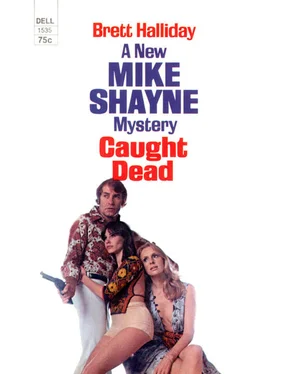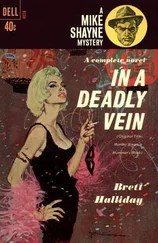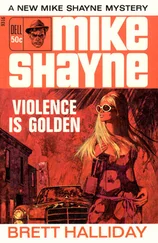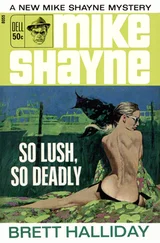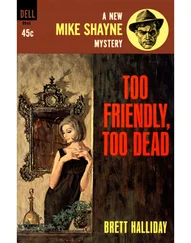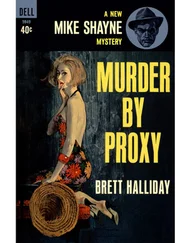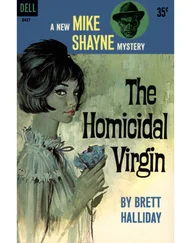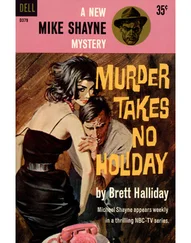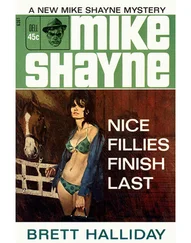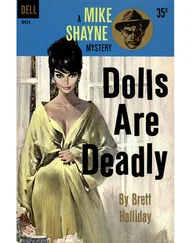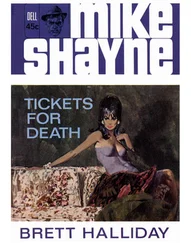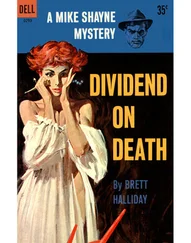Brett Halliday - Caught Dead
Здесь есть возможность читать онлайн «Brett Halliday - Caught Dead» весь текст электронной книги совершенно бесплатно (целиком полную версию без сокращений). В некоторых случаях можно слушать аудио, скачать через торрент в формате fb2 и присутствует краткое содержание. Жанр: Криминальный детектив, на английском языке. Описание произведения, (предисловие) а так же отзывы посетителей доступны на портале библиотеки ЛибКат.
- Название:Caught Dead
- Автор:
- Жанр:
- Год:неизвестен
- ISBN:нет данных
- Рейтинг книги:4 / 5. Голосов: 1
-
Избранное:Добавить в избранное
- Отзывы:
-
Ваша оценка:
- 80
- 1
- 2
- 3
- 4
- 5
Caught Dead: краткое содержание, описание и аннотация
Предлагаем к чтению аннотацию, описание, краткое содержание или предисловие (зависит от того, что написал сам автор книги «Caught Dead»). Если вы не нашли необходимую информацию о книге — напишите в комментариях, мы постараемся отыскать её.
Caught Dead — читать онлайн бесплатно полную книгу (весь текст) целиком
Ниже представлен текст книги, разбитый по страницам. Система сохранения места последней прочитанной страницы, позволяет с удобством читать онлайн бесплатно книгу «Caught Dead», без необходимости каждый раз заново искать на чём Вы остановились. Поставьте закладку, и сможете в любой момент перейти на страницу, на которой закончили чтение.
Интервал:
Закладка:
The Menendez car went through a gate into the prison compound. Rourke parked outside, rang, and was admitted. Menendez, facing a grim prison official, was talking and gesticulating. The prison authorities, it seemed, had not been notified that Lawrence J. Howe had replaced Timothy Rourke as the American who was being given the interview with their celebrated prisoner. Phone calls were exchanged. The appointed time, ten o’clock, came and went. Final approval came through at 10:15. Howe patted the cartons in his pockets and gave Rourke a reassuring nod. He and Menendez, with a three-man escort, went up the stairs.
Rourke returned to the street.
The area around the prison was brightly lighted with mercury vapor lamps. He had parked several blocks away, outside the reach of the lights. Before getting into his car he strolled casually to the next corner.
The sidestreet climbed steeply, twisting, into the hills. A few yards from the corner he saw a closed delivery van. Like all the other vehicles on the block it was parked with its two inside wheels on the sidewalk. This, he surmised, was one of the MIR trucks, loaded with armed men, waiting on streets leading to the prison. One of the detachments had a ladder and ropes to get over the outer walls and unbar the gate. The signal was to be a single pistol shot, fired by an observer posted in one of the apartments overlooking the prison as soon as the first sign of smoke appeared.
Rourke suppressed an idiotic impulse to rap sharply on the side of the truck, to startle the men inside. Throwing away his cigarette, he returned to the rented Ford, where he eased a little of the tension with a few gulps of raw whiskey.
He was putting the bottle back in the dispatch case when the opposite door opened, turning on the dome light. A squat dark man, hatless and needing a shave, in a short-sleeved shirt, looked in.
“Mr. Rourke, I will get into the car with you one minute with your permission,” he said in heavily accented English, and slid inside. He left the door slightly ajar, so the light would stay on, and showed the American a badge pinned to a leather folder.
“Pichardo, of the Caracas police.” Having made that announcement, he pulled the door shut. “I wish something explained, please. Do you understand my English?”
Rourke forced himself to reply evenly. “Barely.”
“I attended the school in Washington, District of Columbia, by the Federal Bureau of Investigation, very interesting, very informative, but I have not many chances anymore to practice the language. I am in a”-he hunted for a word-“condition of questioning.”
“Maybe I can help you.”
“You were driving around in Los Carmenes this afternoon.”
“Do you have some kind of ordinance against sightseeing out here?”
“With a senorita,” the policeman continued. “A North American, I think, from her costume. I took a photograph of her with my zoom lens.”
“She was showing me around. You probably know I’m a newspaperman. I had an interview scheduled for tonight with Alvares. Didn’t anybody tell you that? I wanted to see the prison in daylight so I could describe it.”
With the light off, Rourke couldn’t see the dashboard clock. He lit a cigarette. As the lighter flared he saw that it was 10:35.
“I don’t know why all this concerns you,” Rourke continued. “There was a change in plans. Another guy is interviewing the colonel now. I have to file a story as soon as he comes out, and I’m trying to get the lead set in my head. So if you don’t mind-”
“I have reason to think the young lady of this afternoon has revolutionist connections. Are you aware of that?”
Rourke made a clucking sound. “Such a cute kid, too.”
“I thought so, indeed,” the policeman said. “But what is inside the head can be bad, although the outside face is good, and the body. She visited you in your hotel this evening. She came out by the kitchen entrance. I thought of following her, but as you see I am assigned to you.”
“Am I supposed to be a dangerous leftist too?”
Pichardo said, vaguely, “I am given my orders, which I do my best to carry out-”
And suddenly, without warning, a tremendous blast blew part of the roof off the prison.
The street seemed to lurch violently, and Rourke had the sensation that a cymbal player had just clapped his cymbals simultaneously against both his ears. His head filled with a crash of sound.
He felt stunned and tricked. He had been told that the guerrilla experts had placed a small explosive charge in the cartons, just enough to release the smoke and gas. But this had been something on an altogether different order of magnitude, the equivalent of a couple of dozen sticks of dynamite or a 3000-pound bomb.
Both men had frozen, but Rourke, who had been listening intently for a faint bang or a pistol shot, broke out of it first. He had turned toward Pichardo, his arm resting on the back of the seat. With the echoes still rolling, an instinctive reflex action brought his closed fist down sharply against the side of the policeman’s unshaven jaw.
Rourke knew himself to be one of the least athletic members of a sedentary profession. At six-feet-two, he weighed only 160, and not much of that was muscle. Almost his only exercise was tapping a typewriter with two fingers and fishing orange peels out of Old-fashioneds. He would occasionally lose patience with some right-wing idiot in a bar, to the point where he would throw a punch, but the person he hit rarely fell down. Tonight, desperation gave him strength and the unexpected blow stunned the policeman.
Coming around, Rourke hit him with a flurry of rights and lefts, and a hot flow of pain washed up his arm. Pichardo looked at him stupidly and made a faint sound of protest. Rourke felt to see if he was carrying a gun-apparently not. Feeling a sudden clutch of panic, he lashed out again with both fists, unlatched the door, and tumbled the half-conscious policeman into the street.
Probably no more than three seconds had passed since the explosion. Rourke thought he heard a faint patter, like falling debris. A black ball of smoke rose slowly above the prison.
“Jesus,” he said aloud, and hit the starter.
He was a half block away before he remembered to turn on the lights. If anybody was shouting after him, it was lost in the wild acceleration. He swung to the left at the first corner. The street map he had studied so carefully was gone from his mind. He turned again. Instead of running downhill as he had expected, this street ran up. Remembering that most of the streets around here came to a dead end in the hills, he went into reverse and backed down frantically. As he came around, he heard shouting from the prison, the shrill pipe of a whistle.
He found a main avenue, and this time he made what he was sure was the correct turn. He had been too insistent about those cigarettes. He was in trouble now, in serious trouble, probably the worst trouble of his career. His only hope was to get out of the country before he was picked up and asked to explain. He knew that no blast that great could have failed to kill somebody. Who was the target, why had Paula done this to him-all that would have to wait.
It struck him that he was calling attention to himself by the recklessness of his driving, and he slowed down. The plan-it had been Paula’s and he suddenly mistrusted it-had been for him to circle northward and turn west on the Avenida Liberator, skirting the center of the city. Now nothing looked familiar. Every light seemed to be against him. He tried desperately to think. There was more and more traffic. Halted for a red light, he heard the clanging of a bell, a siren.
When the light changed, he turned south to put the siren behind him and was stopped almost at once by a police barrier. A policeman with huge white gloves herded the traffic off the avenue, where again it clotted. Horns blared around him. He could hear more sirens, and they seemed to be coming closer. He stepped out onto the street and looked both ways. He was caught in a solid freeze of cars.
Читать дальшеИнтервал:
Закладка:
Похожие книги на «Caught Dead»
Представляем Вашему вниманию похожие книги на «Caught Dead» списком для выбора. Мы отобрали схожую по названию и смыслу литературу в надежде предоставить читателям больше вариантов отыскать новые, интересные, ещё непрочитанные произведения.
Обсуждение, отзывы о книге «Caught Dead» и просто собственные мнения читателей. Оставьте ваши комментарии, напишите, что Вы думаете о произведении, его смысле или главных героях. Укажите что конкретно понравилось, а что нет, и почему Вы так считаете.
